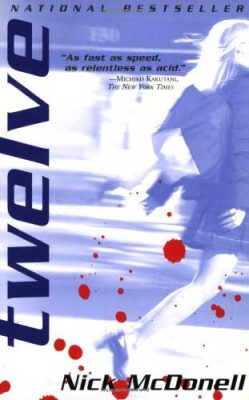Nick McDonell’s Dirty Dozen Has its Moments
Review An assessment or critique of a service, product, or creative endeavor such as art, literature or a performance.
By Michael Malone
 This will never happen again.
This will never happen again.
I opened up the Nick McDonell novel “Twelve” last week, and the first words that greeted me were Part I, Friday, December 27.
It was, indeed, Dec. 27 when I started the book.
Four days later, on New Year’s Eve, I set out to read the final part of the fast-moving novel. Because that’s how I party on New Year’s Eve.
Greeting me were the words Part V, New Year’s Eve.
“Twelve” is about rich kids in Upper Manhattan. They drink a lot and take loads of drugs and contemplate their next sexual transaction. They party in enormous townhouses with parents who are probably off in the tropics.
They are pretty awful.
Except White Mike.
Well, White Mike is awful too. He’s the drug dealer that keeps the rich kids in illicit potions and powders, including a new drug called twelve. His nickname is White Mike, but all of his customers are white. But he’s got some depth, when the other teens are one dimensional. He’s interesting when the others are not. He’s got ambitions; there is more to life, Mike thinks, than delivering drugs to rich kids in townhouses overlooking Central Park.
This drug twelve has some pop. McDonell writes of teen Jessica, “She wants some more of whatever she had the night before. The high was the best thing she’s ever felt. And now it’s faded and gone. And some more would be good, before vacation is over. Just another taste before she has to go back to school. She doesn’t need much or anything. Just a little more.”
The novel, which came out in 2002, moves fast. It has 98 chapters among its 239 pages, many of them just a page or two.
McDonell knows the rich New York kid’s world pretty well. His father, Terry, is a publishing bigwig who once was the editor of Sports Illustrated. He went to private school in Manhattan before he set out for Harvard and Oxford. After that, literary success came fast.
McDonell published “Twelve” when he was 18. His most recent book is the slim memoir “Quiet Street: On American Privilege,” where he examines his moneyed upbringing.
Is “Twelve” good? For an 18-year-old, yes, it is. It is dark and at times funny, including a character named Mark Rothko who is called that because he shoved a kid into a Mark Rothko painting at the Met, and the painting, “Untitled (Number 12),” had to be restored. McDonell has a unique voice, which can be hard for an author to find, whether they are 18 or considerably older.
Beyond the author’s age, is the novel still good? Eh, kind of. Sort of.
I really enjoyed walking in White Mike’s shoes through the streets of Manhattan and beyond. Every other character was despicable and, even worse, uninteresting. But Mike, a depressed and disaffected loner, was intriguing.
Near the end, he walks up to St. John the Divine.
“He grips the back of the chair in front of him until his knuckles crack and turn white,” McDonell writes. “The edges of his overcoat pool on the ground around the chair, and he realizes that he is hot and uncomfortable. The cathedral is very warm. He takes off his overcoat and leans his head back over the edge of his chair and stares up into the high ceiling. Out of the corner of his eye he sees someone else, an old lady, stooped and leaning forward in a chair, head down. He suddenly thinks that his posture might be uncouth, disrespectful, in this place, and he tucks in his legs and leans forward from the edge of his chair and bows his head.”
McDonell brings some serious firearms into the story, as a main character’s older brother, Claude, buys an array of weapons at dingy shops in Chinatown. One wonders, a la Chekhov’s gun, if the firepower is for show, or if the weaponry will see some action.
The answer comes at the end, and it is horrifically, almost comically, violent.
As is often the case when your father is a publishing hotshot, big-name people wrote glittery reviews of the book. Hunter S. Thompson said “the ratio of age to talent is horrifying” for McDonell and his novel. Joan Didion called the book “an astonishing rush of a first novel.”
A review in The New York Times likened “Twelve” to other grim novels from young white men, including “The Basketball Diaries” and “Less Than Zero.” “Although the book devolves at its very end into a bloody and thoroughly unconvincing set piece that is reminiscent of the overblown theatrics of movies like “The Matrix,” the foregoing story attests to a coolly observant eye and an acute ear for teenagers’ non sequiturs and verbal shrugs,” it reads.
Reviews on GoodReads bring “Twelve” back down to Earth. The book has averaged a 3.18 out of 5, with close to 4,200 ratings.
As my own 3-star rating indicates, I mostly enjoyed the novel, and liked it a wee bit more because I happened to read it in the chilly, slo-mo period between Christmas and New Year’s in which “Twelve” is set.
I do think McDonell could’ve come up with a catchier name for the new wonder drug, which would’ve translated to a catchier name for his novel. If you could name a killer new drug anything, might you do better than twelve?
Journalist Michael Malone lives in Hawthorne with his wife and two children.

Examiner Media – Keeping you informed with professionally-reported local news, features, and sports coverage.
